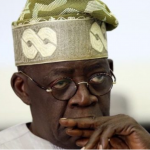
Jagabanomics: PwC says Tinubu’s monetary policies devalued naira by 98%

PwC has reported that Tinubu’s monetary policies devalued the naira by a whooping 98%.
PricewaterhouseCoopers (PwC) is one of the largest professional services networks in the world, providing audit, tax, consulting, and advisory services to businesses globally.
In their report, “Nigeria’s Economic Outlook: Seven Trends That Will Shape Nigerian Economy in 2024,” the business advisory and audit firm analyzed the impact of President Bola Tinubu’s economic policies.
The report highlights the significant 98% depreciation of the Nigerian naira between May and December 2023, primarily due to Tinubu’s policy changes. These included the removal of fuel subsidies and the unification of foreign exchange markets into a single Importer and Exporter (I&E) window.
“Removal of fuel subsidy (which cost $10 billion in 2022), and the collapse of multiple FX windows into a single I&E window, which caused naira to depreciate by 98 per cent between May and December 2023, among other monetary policy efforts, were key programmes executed to spur growth and regain investors’ confidence,” PwC reported.
These policies were initially implemented to attract foreign investment and boost economic growth in 2024. However, they have led to immediate challenges, including a 100% increase in the prices of goods and services, causing widespread hardship.
President Tinubu, in his inaugural speech, highlighted the absence of provisions for fuel subsidies in the 2023 budget and emphasized the adoption of a free-floating exchange rate system. The reforms were aimed at addressing economic concerns, reducing inflation, tackling foreign exchange issues, and ultimately driving investment.
PwC further remarked that CBN has deployed several monetary policy tools and instruments to achieve price stability.
“Despite the deployment of monetary policy tools, the inflationary pressure has persisted. To succeed, the Central Bank of Nigeria (CBN) must independently pursue inflation goals, emphasising inflation control, and maintaining a stable financial system
Implementing these policies without putting in place a solid palliative plan has only done more harm than good, although PwC believes the reforms would have long-term benefits.
About The Author
Related Articles
Ghana’s Prisons to Produce 20% of Sanitary Pads, 30% of Desks and Uniforms for Schools– Interior Minister
The Minister for the Interior, Hon. Muntaka Mubarak, has announced that inmates...
ByOluwasegun SanusiJuly 14, 2025Nigeria: Tinubu’s ‘Renewed Hope’ Agenda Under Scrutiny for Inconsistent Records
President Bola Tinubu’s administration has a bold and expansive plan titled “Renewed...
ByMayowa DurosinmiJuly 14, 2025Cameroon’s 92-Year-Old President, Paul Biya, Declares Bid to Run for Eighth Term in October Election
Cameroon’s President Paul Biya has officially declared his intention to run for...
ByConfidence UbaniJuly 14, 2025U.S. Court Orders FBI, DEA to File Another Joint Status Report by August 7 on Release of Tinubu’s Unredacted Heroin Trafficking Records
The U.S. District Court for the District of Columbia has ordered the...
ByMayowa DurosinmiJuly 14, 2025












Leave a comment